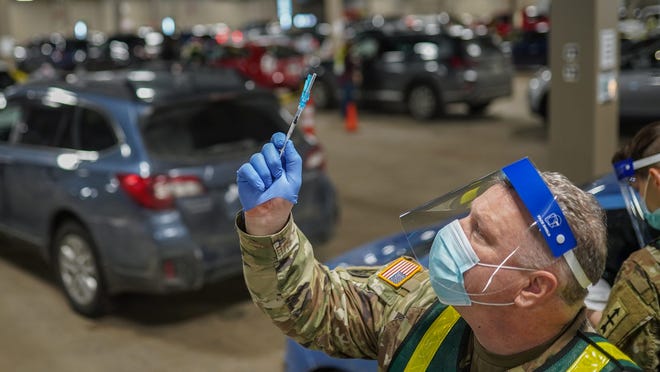
President Joe Biden on Friday toured a Pfizer manufacturing plant in Michigan and stressed the safety of vaccines, saying Americans should get vaccinated "when it's your turn and available."
He pleaded with Americans to get vaccinated as he sought to highlight his administration's vast undertaking to ramp up the production and distribution of COVID-19 vaccines.
The president's message came amid reported vaccine shipping delays due to winter storms across the nation. Andy Slavitt, White House senior adviser for COVID-19 response, said federal partners planned to make Saturday deliveries and backlogged doses were expected to be delivered "within the next week."
"I can't give you a date when this crisis will end. But I can tell you we're doing everything possible to have that day come sooner rather than later," Biden said after touring the Pfizer facility.
USA TODAY is tracking COVID-19 news. Keep refreshing this page for the latest updates. Want more? Sign up for our Coronavirus Watch newsletter for updates to your inbox and join our Facebook group.
In the headlines:
►After early confusion, most hospitals, clinics and vaccination centers now have protocols and systems in place to make sure every last vaccine dose gets used.
►The U.S. plans to open five more community vaccinations centers, including one in Philadelphia, and four in Florida, in Orlando, Miami, Jacksonville and Tampa, Salvitt said Friday.
►The FDA is reviewing data from the Johnson & Johnson vaccine trial and plans to consult with the agency's independent advisory committee Feb. 26. "We should be hearing from them soon," Dr. Anthony Fauci said Friday.
►Pfizer on Friday said it was seeking authorization to store its vaccine in normal pharmaceutical freezers, instead of the ultra-cold temperatures doses currently require.
►California plans to set aside 10% of first vaccine doses for educators, school staff and childcare providers starting in March to help get children back in classrooms, Gov. Gavin Newsom said Friday.
► Experts say the United States could quickly expand the nation's limited testing supply and improve speed by authorizing rapid, paper-based antigen tests. The drawback: Rapid tests are less precise when compared to lab tests, which take longer to complete and cost $100 or more.
? Today's numbers: The U.S. has more than 28.0 million confirmed coronavirus cases and 495,000 deaths, according to Johns Hopkins University data. The global totals: More than 110.8 million cases and 2.45 million deaths. More than 78.1 million vaccine doses have been distributed in the U.S. and about 59.5 million have been administered, according to the CDC.
? What we're reading: "He shouldn't be dead": A year after their father's death from COVID-19, the family is confronting their loss.
Could your Apple Watch, Fitbit help slow the pandemic?
Growing evidence suggests that a smartwatch or wearable such as a Fitbit could help warn wearers of a potential COVID-19 infection prior to a positive test result.
Wearables such as the Apple Watch, Samsung Galaxy smartwatch, Fitbit and other devices can collect heart and oxygen data, as well as sleep and activity levels. Researchers are studying whether a body's health data might signal an oncoming COVID-19 infection.
A COVID-19 infection may not be imminent for a person whose heart or activity data suggests a potential infection. But the increased likelihood – and the ability to alert the patient to get tested and possibly quarantine – could provide a vital tool in preventing the spread of the disease and tracking it, researchers say.
Such findings, if proven out, could lead to remote medical alerts for other possible viruses, flu and undue stress.
– Mike Snider
Argentine health minister resigns amid vaccine scandal
President Alberto Fernández removed Argentina's health minister Friday after a well-known local journalist said he had been given a coronavirus vaccination preferentially after requesting one from the minister.
The president “instructed his chief of staff to request the resignation of health minister” Ginés González García, who is in charge of the government’s COVID-19 strategy, said a government official, who was not authorized to release the information and spoke to The Associated Press on condition of anonymity.
The firing comes on the heels of reports in recent days that mayors, legislators, activists and people close to political power received vaccine shots despite not being in the priority group of doctors, health personnel and the elderly authorized to receive them.
Two-dose Pfizer vaccine here to stay, despite new study
A new study out of Israel reignited the public debate Friday about the spacing between the two doses of COVID-19 vaccine, but the U.S. government isn't budging in its commitment to the original schedule.
The Pfizer-BioNTech vaccine might be just as effective if the gap between doses is wider than the recommended 21 days, according to the new study from Israel. If the doses could be given further apart, more people could be protected faster. Vaccine supplies, which remain quite limited now, are expected to ramp up in late spring.
But government officials want to stick with the dosing schedule that has been scientifically proven to be effective, warning that altering it might weaken the vaccine's effectiveness against variants, or even drive the creation of new variants that escape that protection.
The current schedule provides "an optimal response when you're dealing with variants," Dr. Anthony Fauci, the nation's top infectious disease doctor, said Friday in a news conference.
– Karen Weintraub
Africa reaches 100,000 known COVID-19 deaths
Africa has surpassed 100,000 confirmed deaths from COVID-19 as the continent praised for its early response to the pandemic now struggles with a dangerous resurgence and medical oxygen often runs desperately short.
The 54-nation continent of some 1.3 billion people has barely seen the arrival of large-scale supplies of COVID-19 vaccines, but a variant of the virus dominant in South Africa is already posing a challenge to vaccination efforts. Still, if doses are available, the continent should be able to vaccinate 35% to 40% of its population before the end of 2021 and 60% by the end of 2022, said John Nkengasong, director of the Africa Centers for Disease Control and Prevention.
Health officials who breathed a sigh of relief last year when African countries did not see a huge number of COVID-19 deaths are now reporting a jump in fatalities. The Africa CDC on Friday said overall deaths are at 100,294.
– The Associated Press
Contributing: Courtney Subramanian, USA TODAY; The Associated Press











